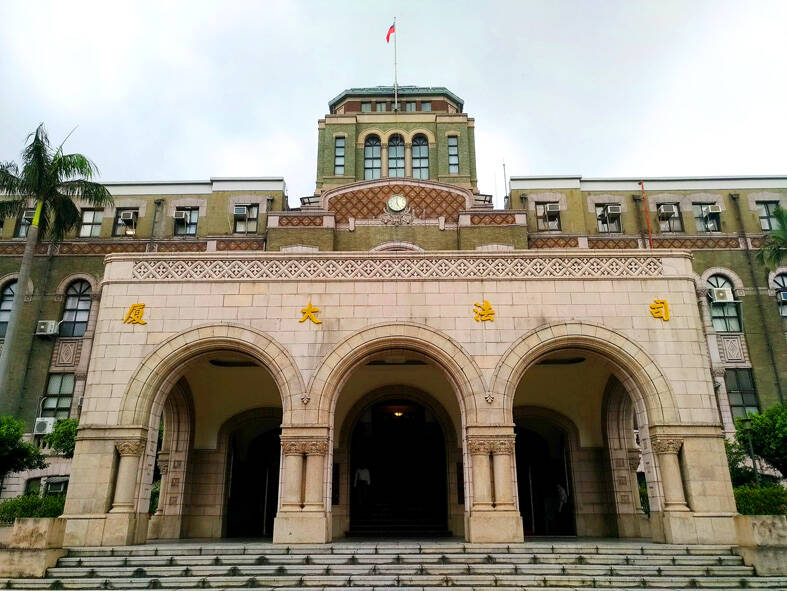An artificial intelligence (AI) program to assist with drafting court rulings, jointly developed by the Judicial Yuan and Chunghwa Telecom (中華電信), would begin a trial run as soon as late next month, after preliminary reviews, sources said yesterday.
Overtime at courts was common due to a great deal of paperwork that has to be processed, which prompted increased efforts to digitize court processes, from allowing remote court attendance to developing AI programs to decrease clerks’ workloads, the Judicial Yuan said.
Criminal court judges had to process 56.1 cases per month in 2013, which had risen to 59.67 per month last year, the source said on condition of anonymity.

Photo: Wu Cheng-feng, Taipei Times
One-quarter of them were driving under the influence (DUI) cases, the source said.
The AI program uses the MT5 large language model, the source said.
It was fed rulings, precedents and legal terminology from rulings from 1996 to 2021, and was trained to produce legal documents in the format used in Taiwan, they said.
Judges had been happy with the preliminary results, they added.
The system is to assist the courts by generating ruling notices for DUI cases, or aiding and abetting in fraud cases, as they are considered single-offense cases, the source said.
A judge would specify whether a defendant was found guilty or not guilty, whether they confessed or denied the charges, legal acts applicable to the case, whether corpus delicti — the principle that no one should be convicted of a crime without sufficient evidence that the crime actually occurred — is met, and select the option for the AI to proceed with a draft, which would include citation of procedural law or legal articles, the source said.
The output would include the opening, the body of the ruling, the verdict, the facts, the reasons for the ruling and the legal citations, they said.
The program is to take precedence into account to gauge the sentence, the source said.
A judge would review the draft and, if satisfied, could immediately enter it into the system as the ruling, greatly decreasing the time spent on draft writing, they said.
The Judicial Yuan on Tuesday is to select the courts at which the system is to be trialed, the source added.

US President Donald Trump yesterday announced sweeping "reciprocal tariffs" on US trading partners, including a 32 percent tax on goods from Taiwan that is set to take effect on Wednesday. At a Rose Garden event, Trump declared a 10 percent baseline tax on imports from all countries, with the White House saying it would take effect on Saturday. Countries with larger trade surpluses with the US would face higher duties beginning on Wednesday, including Taiwan (32 percent), China (34 percent), Japan (24 percent), South Korea (25 percent), Vietnam (46 percent) and Thailand (36 percent). Canada and Mexico, the two largest US trading

ACTION PLAN: Taiwan would expand procurement from the US and encourage more companies to invest in the US to deepen bilateral cooperation, Lai said The government would not impose reciprocal tariffs in retaliation against US levies, President William Lai (賴清德) said yesterday, as he announced five strategies to address the issue, including pledging to increase Taiwanese companies’ investments in the US. Lai has in the past few days met with administrative and national security officials, as well as representatives from various industries, to explore countermeasures after US President Donald Trump on Wednesday last week announced a 32 percent duty on Taiwanese imports. In a video released yesterday evening, Lai said that Taiwan would not retaliate against the US with higher tariffs and Taiwanese companies’ commitments to

CHIP EXCEPTION: An official said that an exception for Taiwanese semiconductors would have a limited effect, as most are packaged in third nations before being sold The Executive Yuan yesterday decried US President Donald Trump’s 32 percent tariff on Taiwanese goods announced hours earlier as “unfair,” saying it would lodge a representation with Washington. The Cabinet in a statement described the pledged US tariffs, expected to take effect on Wednesday next week, as “deeply unreasonable” and “highly regrettable.” Cabinet spokeswoman Michelle Lee (李慧芝) said that the government would “lodge a solemn representation” with the US Trade Representative and continue negotiating with Washington to “ensure the interests of our nation and industries.” Trump at a news conference in Washington on Wednesday announced a 10 percent baseline tariff on most goods

‘SPECIAL CHANNEL’: Taipei’s most important tasks are to stabilize industries affected by Trump’s trade tariffs and keep negotiations with Washington open, a source said National Security Council Secretary-General Joseph Wu (吳釗燮) arrived in the US for talks with US President Donald Trump’s administration, a source familiar with the matter said on Friday. Wu was leading a delegation for a meeting known as the “special channel,” the Financial Times reported earlier. It marked Trump’s first use of the channel since returning to the White House on Jan. 20. Citing a source familiar with the matter, the Financial Times reported that Minister of Foreign Affairs Lin Chia-lung (林佳龍) was also a part of the delegation. The visit came days after China concluded war games around Taiwan and amid Trump’s